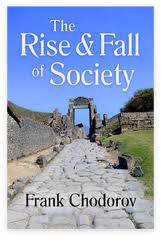Monday

Favorite Books
I finished Chodorov's The Rise and Fall of Society this weekend. What great reading. Light prose, heavy topic. Everything distilled easily, like only a man with a firm grasp on the subject can do. If you're interested in the huge body of libertarian literature (so huge, in fact, that I puzzle how it is so effectively squelched in our culture), start with this masterpiece by Chodorov. He wrote in an effort to imitate his master, Nock, and his Our Enemy, The State. Nock, in turn, was espousing thoughts triggered by Oppenheimer's The State. I've now read all three books, and I give the championship ring to Chodorov. The student surpassed his teachers. I have placed it in my Top Ten list of books that have changed my thinking, even though, admittedly, my mind has been shifting in the libertarian direction for a few years now. * * * * * * * Top Ten? So what other non-fiction books are in my Top Ten? That's a tough question, but these dozen would probably fight for the other nine spots (note: I'm not including the Bible or Chesterton; those books would flood the list): Lewis' Mere Christianity, Schumacher's A Guide for the Perplexed, Deane's The Political and Social Ideas of St. Augustine (not nearly as dry as it sounds), Merton's Seven Storey Mountain, Gilson's Reason and Revelation in the Middle Ages, Senior's The Restoration of Christian Culture, Jones' Degenerate Moderns, Ware's The Orthodox Way, Woods' The Church and the Market, Voegelin's Science, Politics, and Gnosticism, Gordon's The Essential Rothbard, Muggeridge's Jesus Rediscovered. * * * * * * * One Monster, Two Heads: After the November elections, I wrote in these cyber-pages:
Republicans can celebrate, but I'll never forget Nock's observation in Chp. V, Part IV of Our Enemy, The State: “The Party System.” It's easily summed up: If your country is ruled by a state, it doesn't matter what political party is in power. Both parties are merely going to abuse the power for their own benefit. It's inevitable. I'll have to go back and read that chapter because I forget how Nock came to that conclusion, but based on my observations over the past thirty years, I have little doubt he's correct.
I never re-read the chapter, but I ran across this statement by Chodorov in the last chapter of his book: "The transition from negative Government to positive State is marked by the use of political power for predatory purposes." Ah, it must be that simple: Once you have a State in place, it doesn't matter which party is in power. Both of them will prey on society. I still need to re-read Nock, but that must be it. * * * * * * * Chesterton Sighting. Taking a queue from Gilbert Magazine, I occasionally mention when GKC makes it into the popular culture. Last week, he made a fairly big splash, receiving an entire paragraph in the Wall Street Journal. Moreover, it's on the topic of Chesterton's style, a subject that can divide even ardent GK fants. The author, Mr. Henry Hitchens, writes:
An incidental effect of Mr. Farnsworth's selection of examples is a kind of covert literary criticism. We are alerted to G.K. Chesterton's love of chiasmus–the ABBA pattern in which repetition involves reversal. Chesterton writes that "we do not get good laws to restrain bad people. We get good people to restrain bad laws" and that "an inconvenience is only an adventure wrongly considered; an adventure is an inconvenience rightly considered." According to Mr. Farnsworth, the device suited the author because "he believed that modern thought constantly had things backward."
Parting Note: The American Chesterton Society gave its website a long-needed revamp. It's sharp.
